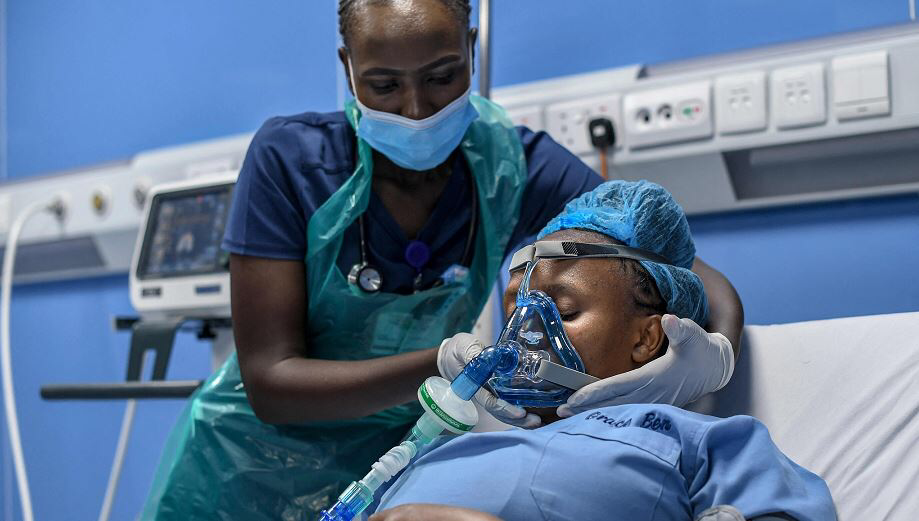
Nurse Emily Chepng’eno (L) fits a ventilator mask during a simulation to demonstrate delivery of medical oxygen at an Intensive Care Unit (ICU) unit following the installation of a modern Oxygen plant at the Metropolitan Hospital in Kenya’s capital, Nairobi on May 5, 2021. (Photo by Tony Karumba via CFP)
In the past year-and-a-half conversations on the urgent need to address chronic underinvestment in Africa’s health sector have abounded, as pundits and policymakers have leveraged sustained global coverage of the COVID-19 pandemic to unmask the deeper challenges facing the continent’s health systems – and used this opportunity to call for greater investment in health by African governments.
Despite global advances in health, Africa continues to shoulder the largest burden of endemic diseases in the world. Today, the continent accounts for nearly two-thirds of all global maternal deaths, more than half of under-5 deaths recorded and nearly 70% of HIV/AIDS infections, not to mention the sharp increase in COVID-19 cases and deaths as a third wave sweeps across Africa amid a worrying shortage of vaccines, medical oxygen, hospital beds and other critical resources.
While swift action by African governments in the early days of the pandemic seems to have helped to prevent the worst in terms of health impact, the regional economy has been hard hit. According to the World Bank, growth was forecast to fall from 2.4 percent in 2019 to between -2.1 percent and -5.1 percent in 2020, the first recession in the Sub-Saharan African region in about 25 years. The effects of this are expected to be felt for the next few years. It is widely accepted that it will take the continent significant time to recover due to an increasingly delicate fiscal position and lack of social protections to cushion the vulnerable population, which may drive millions deeper into poverty and reverse gains made towards achieving health targets in the last decade.
Against this backdrop of economic uncertainty, African countries must still find long-term solutions to strengthen their health systems to achieve Universal Health Coverage and protect their populations.
For years, stakeholders in health have spoken about the urgent need to increase allocation of funds to the sector. Two decades after the Abuja Declaration, which saw African heads of state commit to increase health spending to at least 15 percent of national budgets, fewer than five African countries have managed to meet this target in any one year – and fewer still will be in a position to do so in the near future should the socioeconomic impacts of the pandemic continue to rage on.
With no clear end to the global health crisis in sight, it is time for multi-stakeholder action towards strengthening health systems and providing equitable access with a view to creating far-reaching, better, and more sustainable health impact. COVID-19 is not the first health emergency we are facing, and it certainly won’t be the last. If the global pandemic has taught low- and middle-income countries anything, it is that we cannot afford to be at the mercy of wealthier nations. The lack of equitable vaccine distribution serves as a painful example of this.
A health worker administers a dose of the AstraZeneca PlcCovid-19 vaccine to a resident at Mbagathi Hospital in Nairobi, Kenya, on Tuesday, July 6, 2021. (Patrick Meinhardt/Bloomberg via Getty Images)
Africa must begin to take responsibility for its own health outcomes. It is imperative that we move away from overreliance on development assistance for health, towards finding creative and sustainable ways to finance health budgets from local resources and through publicly led public-private investment. We have an opportunity to position health as an investable option, just as we have done for finance, technology and infrastructure – but with necessary state cushions for the poor and vulnerable
But will increasing health funding and expenditure alone be enough to turn the tide?
History has shown that when African countries become richer, government spending on health does not automatically increase. Per capita, it is estimated that African countries spend between $8 to &129 per capita of general government resources on health compared to an average of $4,000 in Europe. This is despite an average growth rate of 5% between 2000-2018, during which period overall government expenditure on health actually decreased in more than 20 African countries.
Additionally, allocating more funds to health care does not guarantee better health outcomes. In fact, additional health expenditure, without the right structures and policies, has in many countries suffered low budget execution and in some instances led to looting of public coffers as exemplified by widespread procurement corruption during the COVID-19 pandemic.
This, and many other shortcomings in the design and delivery of health care on the continent are a clear indication that while we need to increase health spending, doing so is not the silver bullet to Africa’s health challenges. We must move away from the fixation on increasing spending to also investing in systems and resources – human and technical – that will ensure that funds allocated to health are utilized for the wider good.
We need to reassess our priorities, and do so with the most vulnerable in mind. This calls for spirited efforts towards interrogating the health needs of the majority, identifying and addressing the health system inefficiencies that hinder the achievement of Universal Health Coverage and drive positive health results.
The AMPATH Center at Moi Teaching and Referral Hospital in Eldoret, Kenya.
Photo by: AMPATH
While we acknowledge that there are glaring funding gaps in health, we must also address poor absorption and wastage of funds; reduce spending on ineffective public health programs, and rethink public interventions to make sure they are equitable and impactful. Investing in people-centred primary healthcare that is accessible to all without financial discrimination – not just health facilities – is a good place to start.
Dr. Githinji Gitahi is the, Global chief executive officer of Amref Health Africa.
Cgtn.com
 Africa -China Review Africa -China Cooperation and Transformation
Africa -China Review Africa -China Cooperation and Transformation
